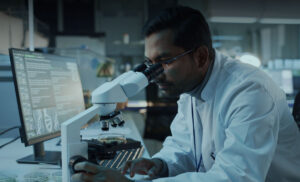As a professional communicator, I love words. But I also know that words won’t save the planet. Only science and action will.
That’s why Spire has – for 18 years now – remained deeply committed to helping scientists and researchers share their stories. Our clients are the brilliant minds we’re all counting on. In the lab and in the field, they work daily to answer vital questions and solve our most critical challenges. By calling attention to their incredible accomplishments, we help highlight the essential role of well-funded R&D programs and drive interest in the sciences.
In honor of Earth Day, I want to shine some light on two of our clients whose work intersects with major environmental issues facing society – and every human who calls this planet home.
Creating clean water out of thin air
Water is heavy and hard to transport. Ask any hiker…or any military supply officer.
Getting clean water to deployed forces is expensive and often risky, and it comes with significant environmental impacts.
DARPA is working to change that.
The agency’s Atmospheric Water Extraction (AWE) program is developing devices that can extract clean, potable water from the atmosphere, even in arid locations. DARPA researchers envision a range of sizes – from individual-scale systems to large versions – capable of sustaining hundreds of people.
Not only would this technology enhance military readiness, it also could save thousands of lives.
According to the World Health Organization, more than 2 billion people around the world live without sufficient and consistent access to clean water. In developing countries where infrastructure is lacking, or communities where water treatment facilities have been compromised by natural disaster, the AWE technology has the potential to safeguard people and animals from disease and dehydration.
Replacing fossil fuels with food waste
The U.S. produces roughly 80 million tons of food waste every year. Most of it winds up in landfills, along with yard waste and other organic materials, where it contributes to the production of methane, a potent greenhouse gas.
But what if we could turn that biowaste into something useful? Even better, what if we could use it to curb our reliance on fossil fuels?
Capra Biosciences has found a way to do just that.
The Manassas, Va.-based company has developed a bioreactor and specific biofilms that convert waste products into valuable chemicals. Capra’s approach is efficient and environmentally friendly – making it possible to replace fossil fuels as a chemical feedstock. Their first commercial product is the world’s first 100% petroleum-free Retinol, and that’s just the beginning of the products and markets it plans to tackle.
As Capra scales up its operations with a new bioproduction facility, their lead scientists continue to refine and extend the technology to produce a wider variety of chemicals. And that means even more relief from the impacts of fossil fuel extraction and emissions.
Protecting land by protecting reefs
Coral reefs have multiple superpowers. They’re home to vastly diverse species – including food sources and potential therapeutics. They’re good for tourism. They also absorb energy from waves. A healthy reef serves as a natural protective barrier against flooding, erosion, and storm damage.
But today, more than 75% of coral reefs are under threat from climate change, fishing operations, coastal development, and pollution.
To protect coastal civilian and military installations, DARPA’s Reefense program is working to strengthen coral reefs. Researchers are developing hybrid structures using biological and engineered materials that mimic reef structures. The project is driving major innovations in materials science, hydrodynamic modeling, and adaptive biology so that the Reefense structures can withstand changing tides and even repair themselves.
If successful, Reefense will be able to accomplish in months or years what would take decades to grow in nature. Not only will this support U.S. security, it will also help restore these vital ecosystems and create new breeding grounds for marine life.
Playing our part
At Spire, we take immense pride and personal satisfaction in bringing stories like this to life. We are suckers for innovation (especially in government) and champions of science and technology in service of the public good.
Our daily work may not change the world directly, but we are staunch advocates – and great cheerleaders – for those who are.









